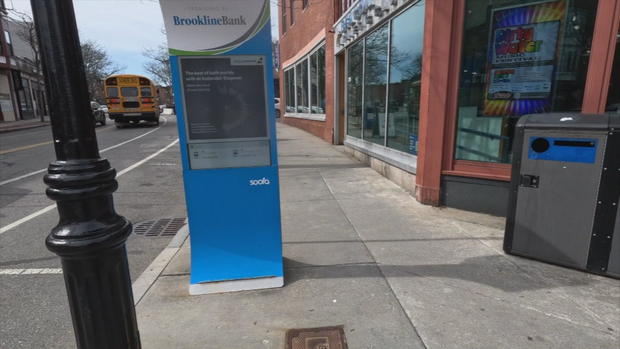Kiosks in Brookline track cell phone data
2024-04-02 / News / 12339 Sees / 0 CommentsBROOKLINE - Data is everywhere. It's at your fingertips. It's plastered all over town, yet often your data may be passed around and you don't even know it. Brookline installed digital signs around town that now have people talking because they are tracking specific cell phone data.
"I guess in today's world everything is tracked whether you like to or not," said Glen Gay, who found himself walking by one of the kiosks on Washington Street. "I am just a little curious what they are doing with the data?"
The kiosks, first reported on by Brookline.News, are made by a local company called Soofa. They display information from bus arrival times to local events. The boards have sensors in the kiosks that detect a unique identifier in your phone if your WiFi is on. The company says the data is encrypted before it gets transferred to their data portal. The information is helping the city to track how many people cross by the boards.
Town officials say the information will allow them to understand the size of the audience the board is reaching. The town is hoping to use the boards to get out localized messaging ahead of the Boston Marathon. The foot traffic data will also allow them to understand how many people are coming to the kiosk areas during the marathon, so they can better tailor the board information to those heavy traffic locations next year.
Phone users will not get a prompt to say that the kiosk is tracking their data.
"I linger here 10 to 15 minutes a day, so knowing that freaked me out a little bit," said Jenna Woods, as she sits near a kiosk. "I wish that it was more public knowledge. I mean, I have nothing to hide, so they can collect as much as they want. Will it be interesting? Probably not."
Cyber experts say all of this is completely legal, and more common than you may think. The data they are tracking is typically broadcast information from a cell phone.
"It says I am here, and a clock that says I am here for a certain period of time. There is no personal identifiable information," explains Peter Tran, Chief Information Security Officer with the IT security firm Infersight. "With cell phones, users have to be aware that you are broadcasting out certain types of information, so the cell towers can authenticate you and know it's your cellphone. What you are normally broadcasting is some basic information about your hardware, your place in the network of AT&T, Verizon, T-Mobile."
Tran says these are single pieces of public information, but if a lot of that information is combined it can be valuable from a monetary standpoint. Soofa assures that no data correlation is performed, nor is any data sold to a third party. Only your phones unique identifier is collected.
"It's not illegal nor violating privacy per se, but from the user, it increases the level to exposure and risk to the users," said Tran.
If you want to avoid collection, Tran suggests turning your WiFi off when you're not using it. The same goes with your Bluetooth.
More about“Kiosks in Brookline track cell phone data,”'s article.
The original address《Kiosks in Brookline track cell phone data》
